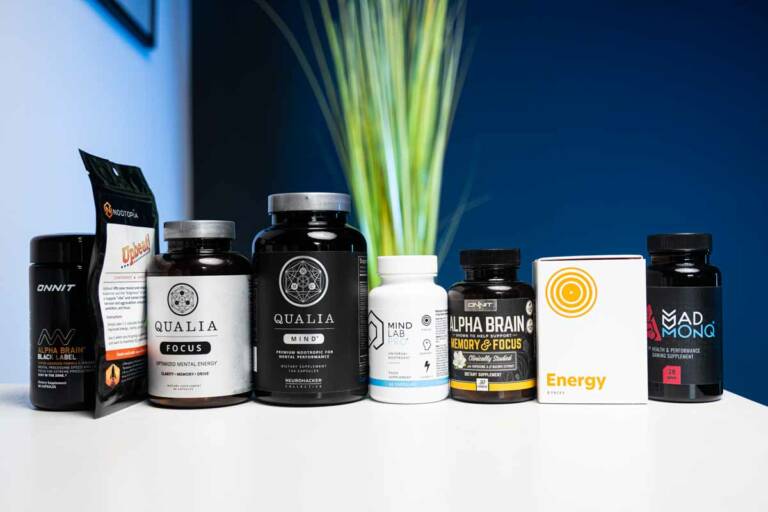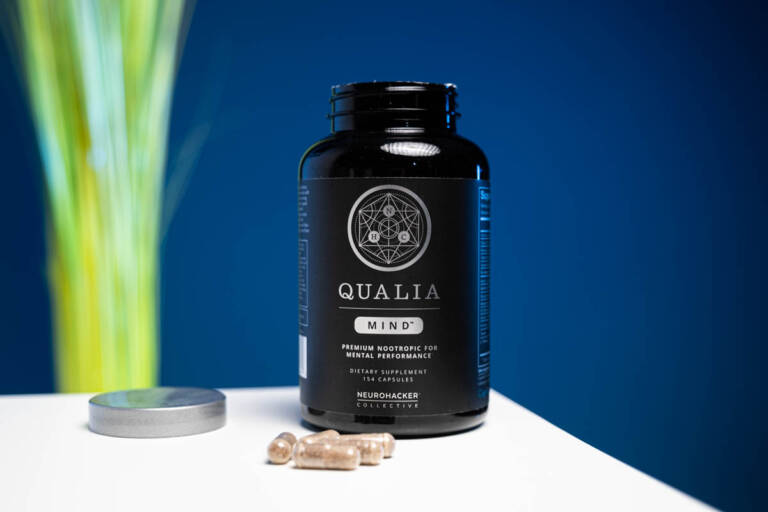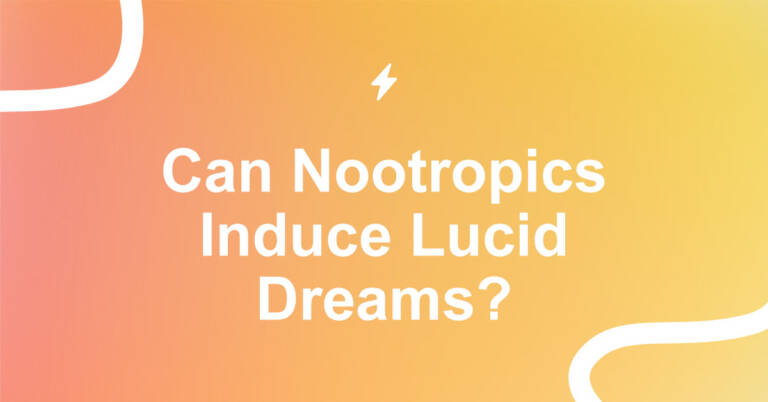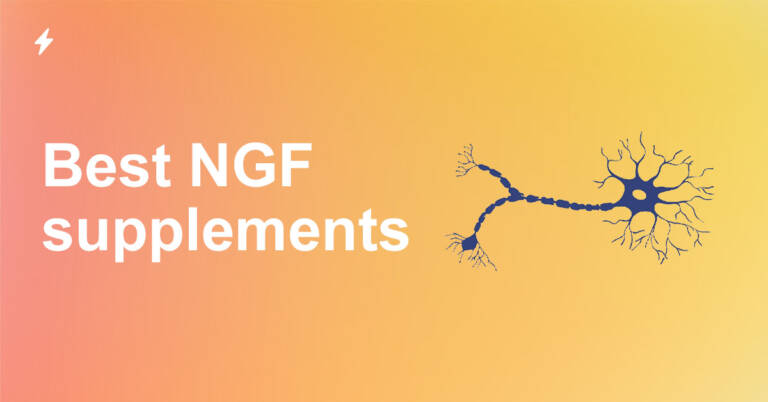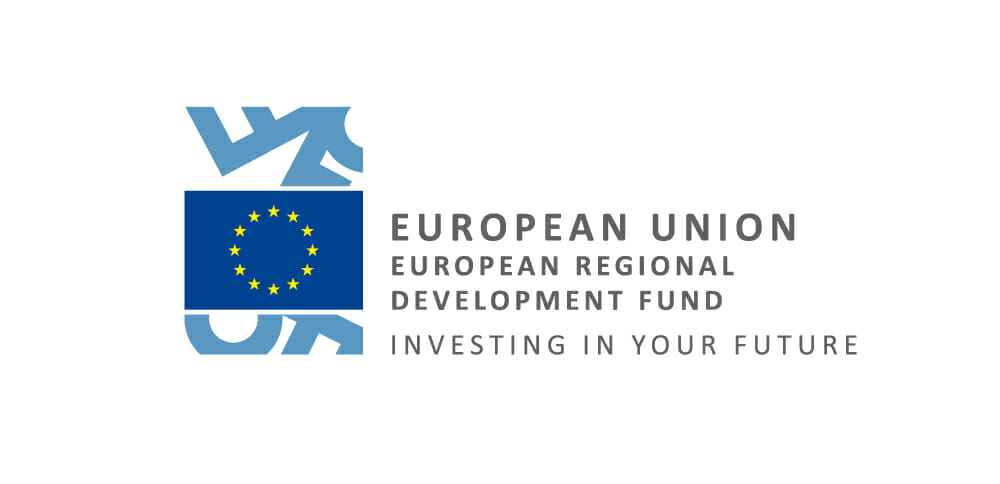With the rise of nootropics’ popularity, many people still wonder if nootropics actually work. Here is the truth: Yes, they do. But not all of them. And not for everyone. So, how do nootropics work exactly? Let’s find out.
How Do Nootropics Work?
Researchers and experts believe that nootropics work by influencing different brain pathways, which consequently optimizes brain structures and neuronal signaling.
By combining multiple nootropics in the nootropic supplements (so-called nootropic stacks), you can simultaneously tackle different brain pathways.
Since there are over 84+ nootropics on the market, we would need to look at each one to explain how it works and what kind of benefits you can expect. Luckily for you, we already did that – you can check it out here.
But in general, human research demonstrates that nootropics affect the brain pathways to provide multiple different benefits – from improved brain function, cognitive performance, focus, memory, attention, and more. We’ll talk about the benefits soon.
Multiple studies on various nootropics confirm the effects on healthy (and also unhealthy) individuals. At the same time, researchers do not know yet how exactly all nootropics work.
That’s why they often suggest possible mechanisms, but only further research will confirm if they are right or not.
Nootropics Enhance Brain Pathways
As we mentioned before, nootropics can enhance various brain pathways. Let’s check them out.
Brain Chemistry
Whenever one neuron transmits neurotransmitters (so-called brain chemicals) to another neuron, we talk about cell-to-cell communication. If the process works well, our mental condition is stable. But whenever there is a chemical imbalance in the brain, our mental condition changes. [1]
In such a case, we may suffer from depression, lack of energy, irritability, insomnia, mood swings, inability to focus, lack of productivity, etc.
Luckily, nootropics may optimize neurotransmitters by:
- Supplying precursors
- Enhancing neurotransmitter synthesis
- Optimizing receptor sensitivity
- Inhibiting breakdown of neurotransmitters
So, which are the crucial neurotransmitters in our brain?
- Acetylcholine – important for learning and thinking
- Dopamine – important for mood and well-being
- Epinephrine – important for energy
- Gamma-Aminobutyric Acid (GABA) – important for calmness and sleep
- Norepinephrine – important for focus and attention
- Serotonin – important for deep satisfaction
Brain Energy
According to studies, our brain consumes about 20% of all energy. So nootropics may optimize brain energy by:
- Providing fuel to mitochondria (the powerhouses of the cell)
- Enhancing mitochondria activity
- Increasing the uptake of nutrients and oxygen
If our body does not provide enough energy to our brain, we usually feel sluggish or suffer from brain fog. A quick uptake of certain nootropics for brain fog (for example, Rhodiola Rosea or caffeine) can quickly help us get rid of mental fatigue.
Long-term effects of low brain energy are related to faster cognitive decline and mental diseases.
Brain Regeneration
Until recently, scientists believed that the brain could not repair itself. But we know now that that’s not true. New neurons are born in the brain every day if the conditions for brain regeneration are met. Such neuron rebirth is called neurogenesis.
If the brain is in proper condition and gets the crucial nutrients, then we can dramatically slow down cognitive decline.
Nootropics may support neurodegeneration by:
- Providing choline to the brain (the “material” for building neurons)
- Boosting NGF (nerve growth factor)
- Helping to maintain brain cell membrane plasticity
Brain Waves
Brain waves are the electrical activity of the brain. The lower brain frequencies are associated with relaxation and sleep, while the higher frequencies mean focus, fast-thinking, and ultimate consciousness. [2]
Here are the five basic brain waves:
Gamma (35 Hz and above) – Consciousness
Beta (12 – 35 Hz) – Focus, attention, activity
Alpha (8 – 12 Hz) – Relaxation
Theta (4 – 8 Hz) – Deep relaxation
Delta (0.5 – 4 Hz) – Sleep
So, how are nootropics related to brain waves? Certain nootropics may either raise or lower brain waves. Consequently, nootropics and supplements can make us more focused or may help with sleep.
Cerebral Blood Flow
Cerebral Blood Flow (CBD) is the blood supply to the brain. Studies show that CBD modulates individual neurons. [3]
Nootropics may support blood circulation by:
- Decreasing the clustering of blood cells
- Activating nitric oxide
- Inhibiting oxidative damage on blood vessels
That’s why B-vitamins are often added to nootropic supplements.
Neuroprotection
Neurodegeneration refers to the loss of function of neurons. Diseases such as Alzheimer’s and Parkinson’s are the result of such loss. [4]
Neurodegeneration is a natural process, part of our aging. But we have the power to speed up or slow down this process. Different lifestyle factors massively contribute to neuroprotection.
Of course, nootropics may help as well. They can:
- Provide crucial antioxidants that fight free radicals
- Protect the brain against stress
- Protect the brain against neurotoxins
Supplementing the right nootropics (especially antioxidants) may provide significant neuroprotection for optimal brain health.
What To Expect From Cognitive Enhancers?
We already answered the question if nootropics work, but what exactly can you expect from them?
Among many other benefits, nootropics may:
- Improve memory [5]
- Enhance focus [6]
- Help with relaxation [7]
- Help to calm down [8]
- Improve sleep [7]
- Improve mood [6]
- Help with brain regeneration [6]
Want to learn more? Check all nootropic benefits here.
But how to get those benefits? Which nootropics should you take? And in what dosages?
Our Favorite Nootropic Supplements
If you know which problems you are trying to solve, then you can quickly find the right nootropic compunds for you. A short study will tell you the optimal daily dosage, how to take them, when to take them, and how to avoid any potential side effects.
However, individual compounds provide very narrow effects. We already learned that multiple nootropics could provide a whole range of different benefits, so how can you get more out of nootropics? By supplementing special dietary supplements or so-called nootropic stacks.
Basically, instead of taking individual compounds, you can combine them in more advanced supplements, which can provide multiple benefits.
Instead of experimenting with nootropics at home and risk potential side-effects, we suggest buying the best nootropics that were developed by leading supplements businesses.
That’s how you will minimize the risks, increase the short-term effects such as improved cognitive function, and get long-term effects as well.
Why Non-Experts Shouldn’t Write About Nootropics (Ever)
We recently came across an article about nootropics published on GQ.com. While it was a grammatically and visually appealing one, it literally made us nuts.
Why?
Because it shows all the flaws of modern “journalism.” The article is about this random guy who clearly has no idea about nootropics, but he has decided to try them and see if he can feel like “Bradley from the Limitless movie.”
He tries L-theanine, then he goes directly to synthetic nootropics, and as it always happens, he cannot go without mentioning smart drugs like Modafinil.
After trying a couple of products for a couple of days, he figures out that he cannot possibly feel like Bradley Cooper.
He doesn’t forget mentioning a couple of “experts” saying there are “no studies” that would confirm the benefits of nootropics. As always, such “experts” cannot go without mentioning studies on “rats,” which don’t prove benefits for humans. (We’re happy he said that, because we’d never thought about it)
Finally, he makes this terrible conclusion that nootropics probably don’t work.
His ergo: “You could also save your money, put your phone down, and go for a walk.”
Because going for a walk brings the same benefits as taking nootropics. Or does it?
Trust The Experts
Instead of listening to non-experts and random journalists, we suggest you always double-check your know-how with real experts – you know, people who devoted their lives to researching and experimenting with dietary supplements.
This is important for several reasons:
- That’s the only way you will get the right information based on evidence
- You will have the right expectations (for example, you won’t expect l-theanine to make you fall asleep)
- You will stop confusing different terms (like smart drugs and cognitive enhancers)
- You will be able to find supplements that actually work (like Ginkgo Biloba for slowing down cognitive decline)
- You will avoid potential side effects
- You will have a chance to improve your brain health, cognitive function, and get amazing short-term effects by taking the right supplements (but not smart drugs!)
